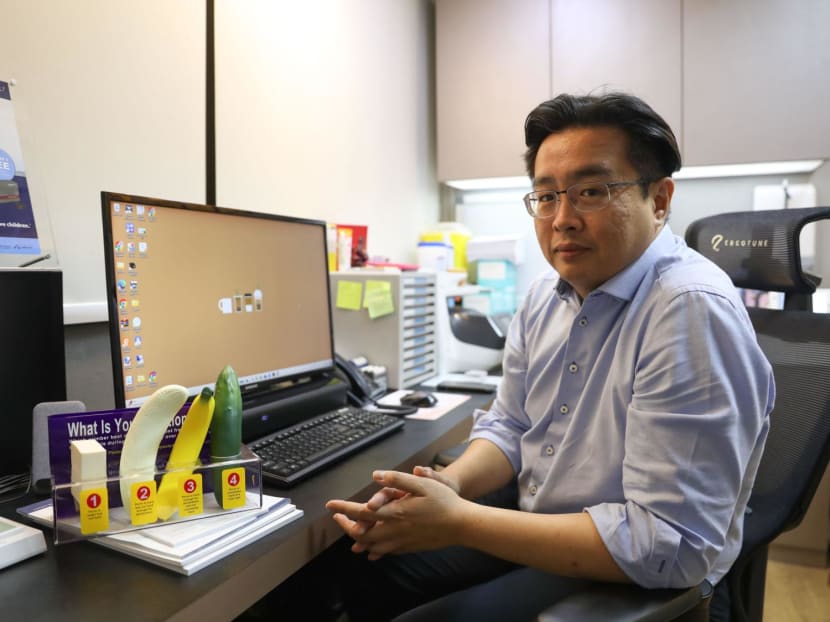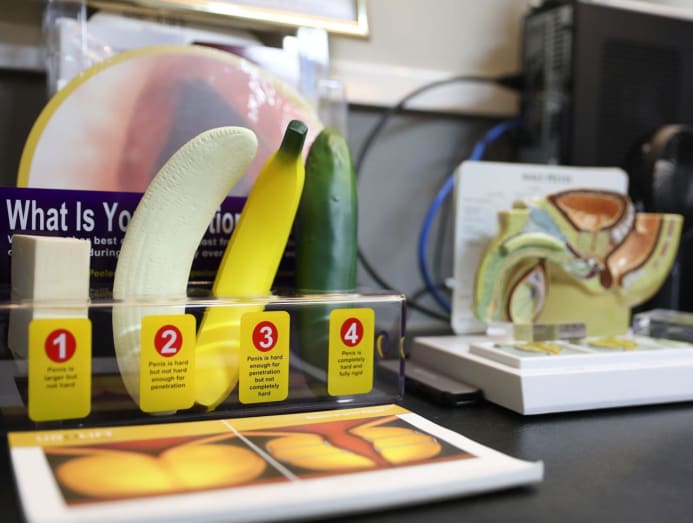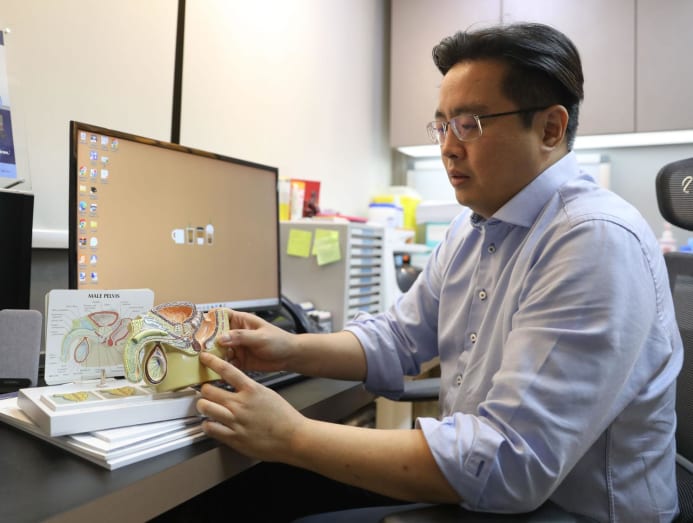‘Stressful for guys to perform’: Singapore men’s sexual health and the things they are doing wrong

Dr Ronny Tan, president of the Society for Men's Health Singapore, pictured in his office at Parkway East Hospital with props used to help explain erectile dysfunction to patients.
SINGAPORE — Here is the difference between men and women when it comes to minding their sexual or reproductive health: A woman may have a gynaecologist to go to for regular check-ups, but a man may not go to a urologist unless he has problems getting an erection or urinating, for instance.
That is what the president of the Society for Men's Health Singapore has observed as a specialist for more than 10 years.
Dr Ronny Tan, 48, is a specialist urologist and andrologist in private practice. Andrology is a medical speciality that focuses on male reproductive health matters such as sexual dysfunction and infertility.
“I find that in general, if men (feel) relatively well, they tend not to go for health screening. Only when they feel that something's wrong do they do something about it,” he told TODAY.
“For example, when they suddenly cannot perform (in bed), experience impotence, they might turn up at the doctor’s clinic for that.
“We then use the opportunity to ask if they have done their health screenings and check for underlying health issues that may be affecting sexual health.”
For instance, erectile dysfunction could be a sign that something may be wrong with cardiovascular health, while a patient with diabetes may have testosterone deficiency.
Other health issues that men typically face include an enlarged prostate and problems passing urine, which may tend to affect older men, but Dr Tan said that when it comes to educating men on how to take better care of their physical health, it is not just targeted at ageing men.
“That used to be the thinking, but that’s not true.”
That is why in recent years, the society has turned to social media to engage younger men, launching a Facebook page called Men’s Health Hotspot, in a bid to “try new things”. There are now at least 2,500 followers and Dr Tan would like to see more.
A key sexual health concern that he observes among his younger male patients revolves around “performance issues”, especially among couples trying to start a family.
“Because of the stress, sometimes the guy cannot perform. They need to find the time to consummate and they are always concerned that their wives are not getting pregnant.”
He noted that many couples here choose to time sexual intercourse only during the woman’s fertile period. This may be due to logistical reasons such as the spouse being overseas for work or a lack of time.
“That causes a lot of stress for the guy who is expected to perform.
“Let’s say if, on that day, he is really not in the mood or too tired, he may not perform well, which then becomes an issue; he starts to worry, wondering if there’s something wrong with him,” Dr Tan said.
He added that many of these problems are psychogenic, meaning they stem from the mind. “It just makes things worse and can affect the relationship.”
In general, couples hoping to conceive are advised to have sex every two to three days each week, Dr Tan suggested.
“If you have healthy sperm in the semen, they can survive in the (vaginal) tract for 72 hours.
“So I tell them to make sure there's sperm waiting for the egg every 72 hours to increase the chances (of conceiving). If it’s only once a month, the chances are very low,” he explained.

Dr Tan is part of a group of men who meet every two to three months to brainstorm and plan their next move in their mission to educate and empower men in Singapore to take charge of their health.
The group, which is the executive committee of the Society for Men's Health Singapore, is made up mainly of urologists and a men’s health physician in the public and private sectors.
Founded in 1999 by Professor Peter Lim, a uro-andrologist, the society has been working behind the scenes to address gaps in men’s health here. Not all its members are men.
In his message on the society’s website, Prof Lim, who is now in his 70s, noted that while women’s health has received considerable attention, men’s health has been largely overlooked.
As a non-profit organisation, the society is run entirely by volunteers including medical professionals, allied health professionals such as physiotherapists, as well as lay members.
The executive committee’s work ranges from organising public health talks three to four times a year to collaborating with other health-related organisations, including the Singapore Cancer Society, to conduct andrology courses. Some of these courses have also been held overseas such as in Indonesia and Malaysia.
Over the years, Dr Tan has observed a gradual but positive shift in attitudes towards men’s health issues in general, including sexual health.
He said: “There have been many initiatives from the Ministry of Health to raise awareness, and there’re also (the society’s) efforts to conduct public health talks.”
The talks, for example, were held to raise awareness on the risk factors of developing diabetes, heart disease, stroke, or all three — and their relation to testosterone deficiency.
The society has also given talks to general practitioners (GPs) on the subjects of testosterone deficiency.
“More patients are coming forward to see me in the clinic for sexual dysfunction and some come together with their partners. Compared to the time I started training in urology, more patients are aware that these are treatable medical conditions.
“They understand that sexual health problems can be treated effectively,” Dr Tan said.
The oldest patient he has treated was a man in his early 80s, who received a penile implant for erectile dysfunction. The surgically implanted device placed inside the penis allow men to get and maintain an erection.
GETTING TO MEN THROUGH FAMILY DOCTORS
Despite some progress, Dr Tan noted that preventive men’s health in Singapore still lags behind women’s health, which he said is chalked up to the different ways men and women tend to deal with their health and symptoms.
To address this, the society has also focused its efforts at supporting GPs, who provide about 80 per cent of primary care services here.
It conducts yearly andrology courses for GPs and has developed practice guidelines to provide them with up-to-date recommendations for specific conditions such as erectile dysfunction and testosterone deficiency syndrome.
The goal is to condense international guidelines to make them “easier to read and more tailored for GPs who see some of the patients who don’t require surgery”. These may include patients who seek medical attention for the first time for conditions such as erectile or ejaculatory dysfunction.
“Many women have a gynaecologist they see regularly whereas men may not feel the need to see a urologist as often," Dr Tan said.
“So their main contact, if anyone, is usually still their GP or family physician who has been taking care of their chronic conditions like hypertension and diabetes.
“When sexual health problems arise, many patients will talk to their GPs first."

DRUGS FOR SEXUAL PERFORMANCE
That is not to say, though, that every man will go to a doctor when they have a sexual health problem.
While the days of back-alley purchases may be dwindling, the risks associated with counterfeit drugs and remedies marketed to enhance sexual performance remain a concern.
“Men may be too shy to see a doctor and would resort to buying (dubious remedies),” Dr Tan said, referring to past cases of severe adverse reactions in people who took illegal sex drugs such as Power 1 Walnut.
Power 1 Walnut and other similar products were found by the Health Sciences Authority (HSA) to be adulterated with glibenclamide, which is a potent prescription-only medicine used by diabetic patients to lower blood sugar levels.
If not medically supervised, it can cause blood sugar to drop to dangerously low levels, which can lead to confusion, seizures and even death if untreated.
HSA has reported cases from the early 2000s of several men who fell into a coma and some later died from consuming such drugs. Hundreds more suffered bad side effects.
People on nitrates for heart conditions should not take PDE5 inhibitors like Viagra, as there's a risk of a drop in blood pressure.
In the new millennium, access to the worldwide web came with its set of dangers. Dr Tan has seen patients who risked their health by buying medications from dubious sources online to enhance their sexual performance.
This applies across the ages and this avenue also appeals to men who are shy or embarrassed and who no longer have to “walk down the back alleys of Geylang to get such medications”, he said.
“We know that there are now counterfeit drugs being marketed as drugs that are like Viagra but they may not be genuine.
“We don't encourage people to purchase their medications online (without properly consulting a doctor),” Dr Tan cautioned, advising those with sexual dysfunction problems to see a doctor in person.
“Some men travel overseas to buy medications that combine a few different drugs for sexual performance (which are not available in Singapore).
“We also don't really encourage this, because certain drugs can be dangerous, especially if you have underlying medical conditions.
“For example, people on nitrates for heart conditions should not take PDE5 inhibitors like Viagra, as there's a risk of a drop in blood pressure.”
To steer men away from these risks, normalising conversations about safe and effective treatments for men’s sexual health is crucial.
“That’s why we run the andrology courses, to try to encourage the GPs to start the conversation first, and if they’re still not comfortable treating these conditions, they will refer to us (specialists),” Dr Tan said.
On why GPs have to be supported in managing such patients, Dr Tan’s view is that sexual medicine and andrology are not well-taught to medical students.
Therefore, on his part, when he was a lecturer at the Nanyang Technological University and the National University of Singapore, he made it a point to teach this to medical students.
“I started by making the clinical relation to the male pelvic anatomy for the anatomy lessons. Hopefully, for the future generation of doctors, they will be more comfortable with talking about these medical problems with patients.
“The society’s courses are well-attended and we are confident that we are able to update GPs in the management of men's health issues. Those who are not comfortable also know that they can refer to a urologist.”
To Singapore men, Dr Tan has straightforward advice: “Regular health checks are important, even if you have no symptoms.
“And if there are any symptoms, including any issues in the bedroom, there's treatment available.
“Seek proper medical care rather than rely on back-alley drugs or unknown online peddlers.”
The Society for Men’s Health Singapore welcomes both medical professionals and lay members from the public. To join, interested individuals (men or women) may contact the society through its website.
For more tips on men’s health, follow the society's Facebook page.
HPV VACCINATION FOR MEN
On June 29, the Society for Men’s Health Singapore issued a new consensus statement, recommending vaccination against the human papillomavirus (HPV) for men in Singapore.
The recommendation, based on current scientific literature and resident health considerations, is the society’s first consensus statement on vaccination, its president Ronny Tan told TODAY.
Authored by 12 doctors, including Dr Tan, the statement highlighted that HPV infection poses “a significant health risk” to men.
HPV is a prevalent sexually transmitted infection associated with HPV-related cancers such as penile cancer, anal cancer and oropharyngeal (throat) cancers, as well as genital warts.
There is no routine screening for men to prevent further progression of HPV-related diseases, and most HPV infections have no symptoms, the society said in its statement
Men who have experienced natural HPV infection may not be protected from recurrent infection, so vaccination is imperative in preventing these HPV-related diseases and improving overall public health outcomes in the population, it added.
For now, HPV vaccination is recommended under the National Childhood Immunisation Schedule and National Adult Immunisation Schedule for all females aged nine to 26 to prevent cervical cancer.
Under the national school-based health programme, the Health Promotion Board offers fully subsidised HPV vaccinations to eligible Secondary 1 and 2 female students attending Ministry of Education-registered secondary schools, special education schools, privately funded schools and full-time madrasahs.
The vaccine is most effective in protecting against the selected HPV types if the person has been exposed before to HPV through sexual activity.
HPV vaccination has been approved in Singapore for use in boys and men from nine to 45 years old since 2020, but the take-up rate is estimated to be low.
The benefits of HPV vaccination in females has been well-established. Research from United Kingdom and Australia — where HPV vaccinations for both males and females around the ages of 12 to 13 are part of the national immunisation programme — has also shown a drop in the prevalence of HPV-related cancers such as oropharyngeal cancer, Dr Tan said.
“What we want to do is start the conversation and raise awareness about HPV vaccination for males. We also aim to educate the GPs and other doctors about it,” he added.






